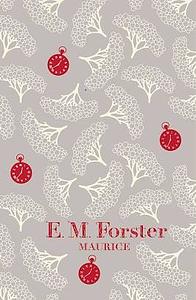Take a photo of a barcode or cover
Like other Forster works (A Room With a View and Howards End, in particular) Maurice is a piece that would have pushed many societal envelopes at the time of writing; however, when read with only modern sensibility, it falters as unimpressive. This is only the case if the book is not read with the historical context in mind, and if you're reading it outside of this context, you might as well not bother to pick it up. Fortunately, the reader is constantly reminded of the historical problems faced by the central character.
Similar to other Forster novels, the subject matter is treated with tender care and not forced upon the reader simply to advance a "taboo." If the book had been published when it had been completed in 1914 instead of in 1971 (published posthumously), it would have outraged simply because of the thought of homosexuality, not because Forster forces homosexuality upon his reader. Forster seems to present his subjects in this manner to fool the typical English thinker into rooting for the characters, until a tragic "flaw" (tragic to the majority of Englishmen) is revealed and the reader is forced to consider where his/her loyalties lie and why they lie where they do.
The protagonist Maurice Hall, knows from an early age that something is not quiet "normal" about him, though he is not sure what it is. Forster eases us into loving the awkward character (awkward because of his feelings, not due to physical appearance since he is a rather striking person). What is interesting about the novel is that it is not simply a study in homosexuality at a time when is was a criminal offense to act as a homosexual, but it is also a presentation of how societies react to people who are misaligned from the norm in a religious way, as well. Maurice battles with belief in an almighty God, and his first lover, Clive, is an outright atheist.
Forster weaves two characters who cannot believe in the normal tenets of society, not for lack of trying, but simply because they cannot wrap their heads around what is normally accepted socially. Forster hints that Maurice is born with inherent differences that ultimately make him more beautiful that those who simply accept the status quo. Forster is perhaps at his best when Maurice attempts to "cure" himself through medicine, tracking down doctors who have eradicated his sexual "illness" in past patients with a certain degree of accuracy.
As the book takes a turn toward cures, it became clear to me that this might be the first Forster novel I was going to read without a happy ending. After reading Howards End, I felt the happiness at the conclusion was a bit unrealistic and was only written so as not to disappoint the readers. While I thoroughly enjoyed Howards End, if Maurice was to have a happy ending, I figured it would end in the protagonist being cured and if that was the case, I probably would have burned my copy of the novel. Miraculously, Forster manages to squeeze out a beautiful ending to work. It is one marked with a twinge of melancholy, and remains wholly realistic. I won't do anything to spoil the plot, but I'd be highly surprised if you're not impressed by the way Forster ends this piece.
After reading the "Terminal Note" following the novel, one finds that Forster poured dedication into this novel fully expecting to publish the book before he died. However, by the year 1960, views on homosexuality had changed direction, but had not taken the exact course Forster had hoped for. The author notes, "I...had supposed that knowledge would bring understanding. We had not realized that what the public really loathes in homosexuality is not the thing itself but having to think about it."
Forster's effort to increase understanding and spur empathy for gay men was one that fell short of a wholly intolerant public. The staunch views on sexuality in general did nothing to help his cause, and it is a bit ironic since this is something tackled by one of the characters consummating his marriage: "[T]hough he valued the body the actual deed of sex seemed to him unimaginative and best veiled in night. Between men it is inexcusable, between man and a woman it may be practised [sic] since nature and society approve, but never discussed or vaunted." If this is the attitude toward heterosexual sex, no wonder homosexual sex was a crime in England until the Wolfenden Report of 1957.
To me, Maurice is Forster's masterpiece. While it may not have had an effect on the public of the time, the feelings of a sexually oppressed person being put down by a sexually repressed society certainly have strains of truth that are still very much relevant in modern society. The book is a beautiful piece of retrospective that one can only hope is never forgotten. I implore you to read this book and share it with others.
Similar to other Forster novels, the subject matter is treated with tender care and not forced upon the reader simply to advance a "taboo." If the book had been published when it had been completed in 1914 instead of in 1971 (published posthumously), it would have outraged simply because of the thought of homosexuality, not because Forster forces homosexuality upon his reader. Forster seems to present his subjects in this manner to fool the typical English thinker into rooting for the characters, until a tragic "flaw" (tragic to the majority of Englishmen) is revealed and the reader is forced to consider where his/her loyalties lie and why they lie where they do.
The protagonist Maurice Hall, knows from an early age that something is not quiet "normal" about him, though he is not sure what it is. Forster eases us into loving the awkward character (awkward because of his feelings, not due to physical appearance since he is a rather striking person). What is interesting about the novel is that it is not simply a study in homosexuality at a time when is was a criminal offense to act as a homosexual, but it is also a presentation of how societies react to people who are misaligned from the norm in a religious way, as well. Maurice battles with belief in an almighty God, and his first lover, Clive, is an outright atheist.
Forster weaves two characters who cannot believe in the normal tenets of society, not for lack of trying, but simply because they cannot wrap their heads around what is normally accepted socially. Forster hints that Maurice is born with inherent differences that ultimately make him more beautiful that those who simply accept the status quo. Forster is perhaps at his best when Maurice attempts to "cure" himself through medicine, tracking down doctors who have eradicated his sexual "illness" in past patients with a certain degree of accuracy.
As the book takes a turn toward cures, it became clear to me that this might be the first Forster novel I was going to read without a happy ending. After reading Howards End, I felt the happiness at the conclusion was a bit unrealistic and was only written so as not to disappoint the readers. While I thoroughly enjoyed Howards End, if Maurice was to have a happy ending, I figured it would end in the protagonist being cured and if that was the case, I probably would have burned my copy of the novel. Miraculously, Forster manages to squeeze out a beautiful ending to work. It is one marked with a twinge of melancholy, and remains wholly realistic. I won't do anything to spoil the plot, but I'd be highly surprised if you're not impressed by the way Forster ends this piece.
After reading the "Terminal Note" following the novel, one finds that Forster poured dedication into this novel fully expecting to publish the book before he died. However, by the year 1960, views on homosexuality had changed direction, but had not taken the exact course Forster had hoped for. The author notes, "I...had supposed that knowledge would bring understanding. We had not realized that what the public really loathes in homosexuality is not the thing itself but having to think about it."
Forster's effort to increase understanding and spur empathy for gay men was one that fell short of a wholly intolerant public. The staunch views on sexuality in general did nothing to help his cause, and it is a bit ironic since this is something tackled by one of the characters consummating his marriage: "[T]hough he valued the body the actual deed of sex seemed to him unimaginative and best veiled in night. Between men it is inexcusable, between man and a woman it may be practised [sic] since nature and society approve, but never discussed or vaunted." If this is the attitude toward heterosexual sex, no wonder homosexual sex was a crime in England until the Wolfenden Report of 1957.
To me, Maurice is Forster's masterpiece. While it may not have had an effect on the public of the time, the feelings of a sexually oppressed person being put down by a sexually repressed society certainly have strains of truth that are still very much relevant in modern society. The book is a beautiful piece of retrospective that one can only hope is never forgotten. I implore you to read this book and share it with others.
emotional
sad
slow-paced
Plot or Character Driven:
Character
Strong character development:
Yes
Loveable characters:
Complicated
Diverse cast of characters:
Complicated
Flaws of characters a main focus:
Complicated
reflective
slow-paced
Plot or Character Driven:
Character
Strong character development:
Complicated
Loveable characters:
No
Diverse cast of characters:
No
Flaws of characters a main focus:
Yes
Hm. The second half was a bit confusing but thought the first half was solid.
emotional
hopeful
reflective
medium-paced
emotional
hopeful
inspiring
reflective
sad
slow-paced
Plot or Character Driven:
Character
Strong character development:
Yes
Loveable characters:
Complicated
Diverse cast of characters:
No
Flaws of characters a main focus:
Yes
medium-paced
Plot or Character Driven:
Plot
Strong character development:
Yes
4,5/5. this book. this. book. i can’t explain how it made me feel. it pulled me into the England of 1912 with simple yet complicated choice of words. i love the characters and how they’re complicated as well. honestly i don’t know what to say. read this book. read it.
With this being my first E.M Forster book, I was pleasantly surprised. The writing was well balanced, feeling less bogged down with details and wandering than most books from this time period. An all round enjoyable read that whilst occasionally questionable in plot and oftentimes severely depressing, ended happily nonetheless. I felt this was a respectable portrayal that although slightly dated, I was glad to have encountered nonetheless. Luckily enough Forster had the sense to wait a few decades so that everyone can now read it unedited and in its full glory without annoyingly poor editing like other 17th and 18th century novels in the past have had to undergo.
Plot or Character Driven:
Character
emotional
reflective
sad
slow-paced
Plot or Character Driven:
Character
Strong character development:
Yes
Loveable characters:
Complicated
Diverse cast of characters:
No
Flaws of characters a main focus:
Yes





